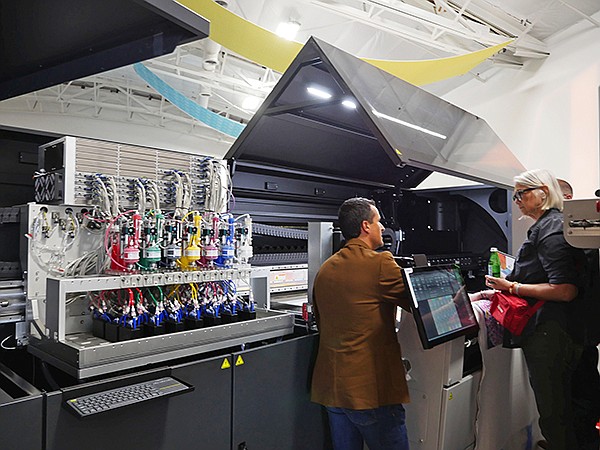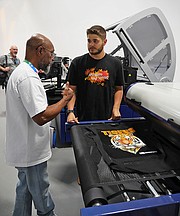TECHNOLOGY
Kornit Digital Taking Its Direct-To-Garment Show On The Road
Kornit Digital’s Presto S printer is about as big as a limousine and can function as a mini T-shirt factory, said Robert Zoch, a global content manager for the printer company, headquartered in Englewood, N.J.
Zoch and other Kornit staff gave people in the American imprinted-textiles business a first look at the Presto S during the company’s Road Show. The Presto S was officially introduced in June at the ITMA 2019 trade show in Barcelona. Kornit’s traveling printer showroom made its first stop in Los Angeles Sept. 11–13 at the Optimist Studios production space near Los Angeles International Airport.
The Road Show was the first time that the Presto S was displayed in North America outside of Kornit’s New Jersey offices, and it also gave a stage to other machines that Kornit released this year, such as the Avalanche Poly Pro DTG printer. The Road Show also gave space to the Kornit Storm HD6, which was released in 2018.
The Poly Pro printer was introduced in April and is used for poly-blend materials typically found in sports apparel and athleisure clothing. While the Poly Pro was designed to print graphics on polyester fabrics, the Storm HD6 was designed to print on T-shirts, cloth for bags, denim and almost any other fabric, Zoch explained.
“The Storm HD6 is our workhorse for direct-to-garment printing on demand, sustainably and with minimal setup,” Zoch said. “It’s perfect for e-commerce.” When using the Presto, a machine operator prints whole fabric, then cuts and sews from that material. To operate the other machines exhibited, the devices basically print on a finished T-shirt blank, jean or onesie.
The Presto S and other machines were designed to serve the growing on-demand printing and direct-to-garment printing businesses, which are fueled by the market for customized goods and are building more of a significant presence in the T-shirt business. These companies range from garage operations to established businesses that produce limited runs of T-shirts.
Steve Nanino of Los Angeles–headquartered apparel brand Kid Dangerous maintains a focus on the on-demand printing and direct-to-garment printing business. He said it is increasingly the industry norm for direct-to-garment printers to take care of every step of production for themselves.
“You essentially have to be a one-stop shop to be in the digital-printing space,” Nanino said. “It doesn’t make sense to pass off half finished inventory to someone else. You’ve got to produce from start to finish.” Like many others in the space, Nanino uses several machines to pretreat, print and heat-press shirts.
Zoch said that the Presto S is a roll-to-roll printer that uses specialized inks to print directly onto a roll of fabric, using what Zoch called a fast, single-step method. For this system, it can take less than 60 seconds to imprint a garment, then just a few minutes to cure—or dry—it. The fabric is moved on an adhesive belt conveyor system, and the machine is able to print about 4,800 square feet of fabric during an hour.
“It’s very unique. It’s the only machine that makes pigments that do not need a pretreatment,” said Michael Sanders, director of printable textiles and finishing technologies at Top Value Fabric of Carson, Calif. “Others say that that their machines don’t need a pretreatment. But they don’t hold up as well for wash fastness and crocking.”
A statement from Kornit contends that only one person is needed to operate the Presto S machine. The operator basically loads fabric into the machine, where Kornit’s Robusto inks are bonded to the fabric before it passes through a dryer and becomes ready to cut.
Businesses using one direct-to-garment system often upgrade to larger systems, Zoch said. The Presto S is intended to be used by companies interested in diversifying their customized business through a process that allows them to print and cut garments roll to roll. Zoch declined to state the cost of the Presto S. He said that it was competitive with other roll-to-roll print systems on the market.
Zoch also said that the Presto S is an environmentally sustainable machine. Its Robusto inks meet the standards of sustainability certification groups Eco-Passport and GOTS, according to a Kornit statement. Zoch also said that the machine creates no water waste, and there are no chemicals to dispose of after a job is done.
Also participating in Kornit’s Road Show were brands that use Kornit such as Cotton Heritage, headquartered in Commerce, Calif. All of the cotton and cotton/poly tees used for demonstrations in the Los Angeles stop for the Road Show were Cotton Heritage styles, said Ken White, the apparel brand’s vice president of sales.























